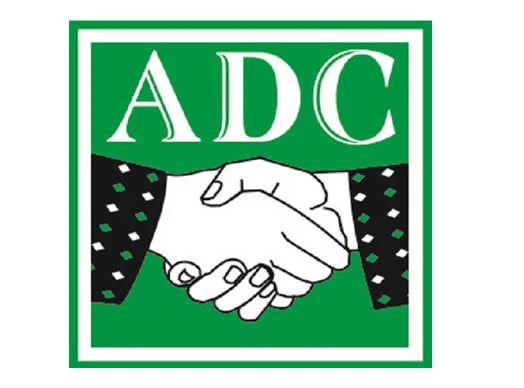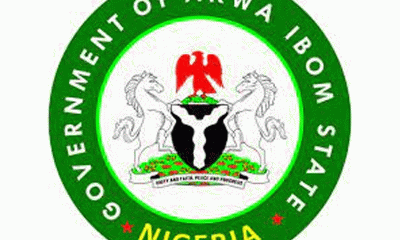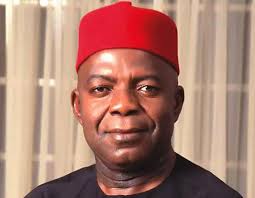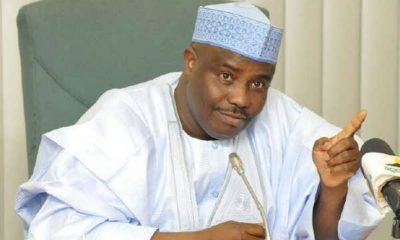NEWS
Buhari Launches New Visa Policy, Increases Categories to 79

By Mathew Dadiya, Abuja
President Muhammadu Buhari yesterday in Abuja said that the Federal Government is ready to attract more businesses and investment opportunities with the launch of the new Visa Policy 2020 that will fascinate innovation, specialized skills, and knowledge from abroad to complement local capacity.
The President said in his remarks at the official presentation of the Nigeria Visa Policy (NVP) 2020 that “the implementation of the Nigeria Visa Policy 2020 would support the attainment of a globally competitive economy for Nigeria by building on the efforts of the Presidential Enabling Business Environment Council”.
Buhari noted that the policy would improve the business environment, attract Foreign Direct Investment and boost tourism without compromising national security.
“Earlier in the course of this Administration, we introduced the Economic Recovery and Growth Plan (2017-2020) with one of the objectives being to minimize bottlenecks, which impede innovation and market-based solutions for building an inclusive economy.
“The Nigeria Visa Policy 2020 is intended to attract innovation, specialized skills and knowledge from abroad to complement locally available ones,’’ he added.
He also noted that the Nigeria Visa Policy 2020 would provide an avenue to achieve African integration by introduction of visas on arrival for short visits to Nigeria for holders of passports of African Union countries.
“I, therefore, commend the document to the international community, foreign and local business entities. We are open for business”, Buhari said.
In his remarks, the Minister of Interior, Ogbeni Rauf Adesoji Aregbesola, said that the visa policy took into consideration specific needs of foreigners, who would want to visit Nigeria without compromising the security of the country.
According to the minister, the policy had followed a process that considered the security, economy and territorial integrity of the country, and would only be issued after due diligence with other security components of the country.
“Especially, the new visa policy will be helpful to diaspora Nigerians by birth who can now use other passports to visit the country because some countries do not allow dual citizenship,’’ he added.
In a technical presentation, the Comptroller General of the Nigeria Immigrations Service (NIS), Muhammad Babandede, said that the service had already put in place a technological hub, called the Migrants Information and Data Analysis (MIDAS), to ensure strict compliance with the conditions for the issuance of the visa.
Babandede assured that issues of corruption or bribery will be controlled by the automated system, while allaying fears of possible infiltration of the economy by criminals and terrorists.
He said that the new policy has 79 categories, which include health; journalist; education; tourism amongst others.
He pointed out that the Economic and Financial Crimes Commission, National Intelligence Agency (NIA) and the Interpol also made inputs into the system, and would be carried along in the processing before approvals.
The 79 visa categories fall into these three major categories: Short Visit Visa (SV);
Temporary Residence Visa (TRV); and
Permanent Residence Visa (PRV)
Short Visit Visas allow travellers to visit Nigeria for a period not exceeding three months for the purpose of visit, tourism, business meeting, conference, seminar, contract negotiation, marketing, sales, purchase, distribution of Nigerian goods, Trade Fairs, job interview, sports, entertainment, study tour, academic exchange programme, humanitarian services, relief/emergency works and temporary work permits.
Temporary Residence Visa: Temporary Residence Visas allow individuals reside in Nigeria for a period two years, subject to renewal, for the purpose of employment, establishments internship, accompanying employed migrants or students or diplomats as dependants.
Permanent Residence Visa: Permanent Residence Visas permit certain class of individuals to obtain permanent residence status in Nigeria.
These individuals include Spouses of Nigerian citizens. Nigerians by birth who renounce Nigerian citizenship, and their spouses; as well as investors who import an annual minimum threshold of capital as may be specified high skilled individuals as well as some categories of retirees.
Asked why 79 classes of visa from six, the Interior Minister explained that “the reason is simple, we want to be very detailed in the classification of people who we have to bring into our country so as to limit the chances of any one of them escaping our watch. It is to enhance security, that is the number one consideration.
“Secondly, it is to expand our economy. Let me give you an example, I won’t mention the name. A university wrote me as the minister to request for a specific number of visa allocation so as to enhance the number of students coming to that institution. Others would not even know how to handle such request and for every foreign student you have, it is a boost to our economy because they are not going to pay naira, they will pay in foreign currency. And you know for every dollar you earn is a boost to Nigerian currency, economy and our reserve.
So, we now have a specified visa for education.”
“For religious tourism, we know and I won’t mention name, that they are people who come into this country purely for spiritual matter, we can’t deny it because it exists. There are people who come to simply go to OPA-Oranmiyan in Ife, Obara Gida Well in Daura, we want to be sure that such people are captured separately so as to monitor them and ensure that there is no risk attached and there is no threats to our security”.
NEWS
Again, ADC Tells EFCC to Stop Witch-hunting, Media Trial of Opposition Leaders

By Johnson Eyiangho, Abuja
Again, the African Democratic Congress (ADC) has come hard on the Economic and Financial Crimes Commission (EFCC), asking the commission to stop both the media trial and witch-hunting of opposition leaders.
The ADC accused EFCC of being used by the government to harass and intimidate opposition party leaders.
On Monday the commission detained one of the leaders of the coalition and former Governor of Sokoto State, Aminu Tambuwal, and subsequently invited Imo State Government officials to “urgently” provide information on the seven-month tenure of former Imo State Governor, Emeka Ihedioha.
With this, the party said that it has become crystal clear that the EFCC is out on a hatchet job — “a choreographed media trial targeted at bringing coalition leaders to disrepute.
”n a statement by its National Publicity Secretary, Mallam Bolaji Abdullahi, on Tuesday the ADC questioned why the EFCC had suddenly found “urgent” reason to investigate David Mark 10 years after leaving the Senate Presidency, Ihedioha more than five years after his brief tenure as governor, and Tambuwal two years after leaving office as Sokoto governor.
It said the pattern of ignoring APC stalwarts with fresher and well-documented cases, while targeting opposition figures with stale allegations, is proof of selective justice and an assault on political freedom.
Abdullahi said the detention of one of the Coalition leaders, former Sokoto State Governor, Senator Aminu Tambuwal, marked the start of the crackdown intended to intimidate key leaders of the opposition and discredit them through media trials.
“As shown in an EFCC correspondence currently circulating online, the Commission has now embarked on the investigation of another coalition chieftain, former Imo Governor, Emeka Ihedioha, with an “urgent” request to the officials to provide information related specifically to his brief seven months in office.
“Rt. Hon. Emeka Ihedioha, the former Deputy Speaker of the House of Representatives, served as Governor of Imo State for just seven months, from May 29, 2019, until the Supreme Court removed him on January 14, 2020 — a full 5 years and 7 months ago. We therefore wonder what makes investigating him suddenly “urgent” now.
“Most notably, the EFCC has now surreptitiously started excavating all the files from the ADC Chairman, Senator David Mark’s tenure as President of the Nigerian Senate. Let us remind Nigerians that our Party Chairman, Senator Mark, served as the Senate President for eight years, from June 6, 2007, to June 6, 2015 — making him the longest-serving Senate President in our history. He left office 10 years and two months ago. Three Senate Presidents after, the EFCC suddenly remembered that he was a Senate President,” the statement said.
Abdullahi said the ADC believed in adherence to the rule of law and due process, like all Nigerians, but questioned the curious timing, selective targets, and political motivations that now seem to define the EFCC’s actions.
According to him, a fight against corruption that begins and ends with the opposition is not justice — it is persecution. We have no doubts that this is witch-hunting; it is the APC government weaponising anti-corruption to do its political battle.
He said that having failed to stop the coalition, the jittery ruling party’s next move was to discredit its leaders by getting the EFCC to accuse them of looting the entire treasuries, noting that there were calculated media trials, which start and end with the accusation, the scandal, and the consequent lowering of public estimation. “It matters little whether there is a basis for these accusations — the game is the circus show.”
He said: *The questions write themselves: why now? Why these men? Why these timelines? If corruption truly has no statute of limitation, why are the EFCC’s files on APC’s own “big men,” many with fresher, documented cases, gathering dust in forgotten drawers? Why does the EFCC only discover “urgent” anti-corruption zeal when an opposition leader becomes a political threat?
“The truth is simple. These are not fresh investigations — they are political manoeuvres, cynical attempts to intimidate and weaken credible opposition voices ahead of the 2027 elections. The APC’s EFCC does not touch its own while they are in office or when they defect to the ruling party.
“Once a former governor crosses over, their files vanish like morning dew. Since Ifeanyi Okowa joined the APC, have Nigerians heard a single whisper from the EFCC about his cases? Yet opposition leaders are hounded with allegations from decades past without a shred of new evidence.”
He said what the EFCC is doing on behalf of the APC government is anti-democracy, adding that every time the EFCC is deployed as a political bulldog, it tramples on public trust and shreds the credibility of our justice system, reminding the APC that state institutions did not belong to it, but to Nigerians.
“We call on citizens to speak up, to resist, and to demand that the EFCC stop this witch-hunting in the interest of our democracy. Today, it is David Mark, Ihedioha, and Tambuwal. Tomorrow, it could be anyone who dares to hold this government accountable.”
| ReplyReply allForwardAdd reaction |
NEWS
FCTA Champions Livestock Development to Boost Food Security

By Laide Akinboade, Abuja
The Federal Capital Territory Administration has emphasized the strategic importance of strengthening livestock production, aimed at boosting food security, and promoting sustainable agricultural development across the nation.
FCT Minister of State, Dr.
Mariya Mahmoud made this known at the 2025 National Pasture Planting Day held at the Kawu Grazing Reserve in Bwari Area Council, Abuja.She explained that pasture planting is more than a farming activity, stressing that it serves as a key intervention to ensure the year-round availability of quality feed for livestock, reduce overgrazing and land degradation, and advance the transition to modern, settled livestock systems.
According to the minister, these efforts would not only increase productivity but also help prevent conflicts, foster peaceful coexistence, and protect the environment.
Describing the Kawu Grazing Reserve as a strategic agricultural asset within the Federal Capital Territory, Mahmoud noted that with enhanced pasture management, improved water infrastructure, and expanded veterinary services, the reserve has the potential to serve as a model for other states nationwide.
This, she said, would enhance milk and meat production, create employment opportunities, and support harmonious relations among rural communities.
The minister commended the Federal Ministry of Livestock Development for leading the initiative and acknowledged the dedication of farmers, herders, and development partners who continue to innovate within the sector.
Mahmoud also reaffirmed the FCT Administration’s commitment to supporting pasture development projects that secure the future of Nigeria’s livestock industry.
She described the planting event as a symbol of a shared vision for abundance, peace, and prosperity.
According to her, “The National Pasture Planting Day event underscores the President Bola Ahmed Tinubu’s proactive approach to overcoming challenges in the livestock sector, particularly the consistent availability of quality animal feed, positioning Nigeria toward a more modern, productive, and profitable livestock value chain.”
Also speaking, Minister of Livestock Development Alhaji Idi Mukhtar Maiha, noted that the event marks not just planting of seeds in the soil, but the sowing of a vision, the vision of renewed hope agenda for resuscitating great reserves, sustainable livestock development, environmental stewardship, peaceful pastoral practices and economic empowerment of millions of Nigerians who depend on livestock for their livelihoods.
Maiha revealed that the ministry is investing in release and registration of pasture varieties into the national seed system, noting that eight varieties have been released for the first time in 48 years.
The Minister assured that the present administration is fully committed to implementing the National Livestock Growth Association Strategy, which has been approved by National Economic Council and other policy frameworks that promote peace, productivity and prosperity in livestock.
He called for collaboration and cooperation within the community and between the community and the government to make the grazing reserves work.
| ReplyReply allForwardAdd reaction |
NEWS
FCTA Promotion Exams: 915 Directors Sit for Computer-Based

By Laide Akinboade, Abuja
The Federal Capital Territory (FCT) Civil Service Commission yesterday revealed that 915 workers, mostly at directorate cadre, have been cleared for a Computer-Based Promotion examination.
The Commission said that the participants, drawn from the Universal Basic Education Board (UBEB) Secondary Education Board (SEB) Education Secretariat and other Departments and Agencies, would have to prove their qualification for the next level through the examination.
Chairman of the Commission, Emeka Eze noted that the computer based examination was introduced to ensure that those who would move to substantive positions as directors, are well qualified to face modern technology-driven challenges associated with the work.
Eze also disclosed that the FCT Minister, Nyesom Wike, who created the Commission with the approval of President Bola Tinubu, wanted to resolve the backlog of promotions that has been pending for many years.
While he revealed that the verification exercise to determine the workforce of the FCT was yet to be completed, he also disclosed that the commission encountered too many falsification of age in the service records.
According to him, workers who were caught in the web age falsification were asked to retire from the service.
Representative of South-East in the Commission, Martins Azubuike stated that participants who fail to scale through in the exams will have no one to blame for remaining in their position.
Azubuike also disclosed that the Computer based tests have come to stay in the system, and it remains a measure that will encourage workers to update their digital skills.


















0 Comments